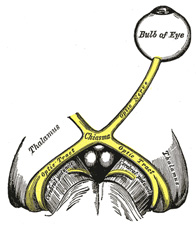2 The diagnosis of Functional Neurological Disorder (FND) is a complex process that involves a combination of clinical assessment, the exclusion of other neurological or medical conditions, and the identification of positive signs consistent with FND. It is not a diagnosis of exclusion, nor should symptoms be categorized as medically unexplained (MUS)[2]. A diagnosis should…
4 Introduction Functional cognitive impairment (FCI) following mild traumatic brain injury (mTBI) involves a complex interplay of neurological and psychological disruptions that extend far beyond the initial event of head trauma. As a condition often characterized by its invisibility on conventional neuroimaging, FCI manifests through a spectrum of symptoms that significantly impair an individual’s cognitive…
3 Anatomy of the Second Cranial Nerve The second cranial nerve, also known as the optic nerve, is a pivotal component of the visual system. It is not a true cranial nerve but rather an extension of the brain parenchyma, which transmits electrical impulses from the retina to the brain to be processed into visual…
4 Detailed Analysis of the Anatomy and Course of the Olfactory Nerve The olfactory nerve, or Cranial Nerve I, is unique among cranial nerves as it is solely sensory and dedicated to the sense of smell. This nerve originates from the olfactory epithelium in the nasal cavity. The olfactory epithelium contains olfactory receptor cells, which…
4 Introduction Functional Neurological Disorders (FND) are characterized by neurological symptoms that are not explained by identifiable neurological disease. The diagnosis of FND is complex and requires a careful approach to avoid misdiagnosis, which can have significant legal and ethical implications. Misdiagnosis can lead to unnecessary treatments, psychological harm, and a lack of informed consent….
2 Introduction Functional neurological disorders (FNDs) are conditions where patients experience neurological symptoms, such as movement or sensory disturbances, without a clear structural cause. The diagnosis and management of FNDs can be challenging due to the lack of specific biomarkers. However, recent research has been exploring various potential biomarkers that could aid in the diagnosis,…
3 Overview Functional cognitive impairment (CI) after mild traumatic brain injury (mTBI) is a significant concern due to its potential to induce long-term cognitive deficits. The risk factors for CI post-mTBI are multifaceted and include both pre-injury conditions and injury-specific characteristics. Pre-Injury Comorbidities Pre-injury comorbidities have been associated with functional impairment and post-concussive symptoms after…
3 In the intricate landscape of human cognition, our perception of time remains one of the most elusive and fascinating subjects. Recent research spearheaded by cognitive neuroscientist Virginie van Wassenhove at the University of Paris–Saclay delves into how our sensory organs, traditionally not dedicated to sensing time, play a crucial role in how we perceive…
17 IntroductionFunctional Neurological Disorder (FND) presents a unique challenge in neurology and psychiatry due to its complex nature and the absence of clear organic causes for the symptoms. Unlike other neurological conditions, the symptoms of FND, such as motor, sensory, or cognitive disturbances, do not stem from deliberate actions and vary widely in severity. This…
64 Join Dr. Mavroudis, a consultant neurologist, as we explore the fascinating changes in personality traits often observed in postconcussion syndrome. Drawing from years of clinical experience and research in neuromorphology and neuroscience, this video aims to shed light on these changes’ psychological and neurological underpinnings. It is ideal for healthcare professionals, patients, and caregivers…

